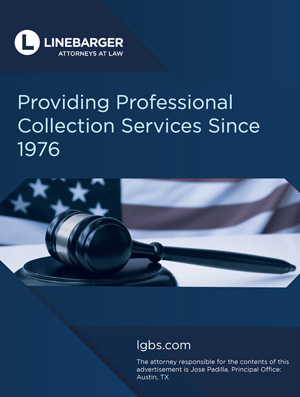Rick Pierce
- Judicial Programs Administrator, Administrative Office of Pennsylvania Courts
- Director, NACM Chair of Governance Committee
- Assists over 900 general- and limited-jurisdiction judges upon request
- NACM member since 1988
How did you get started in court administration?
My mother’s best friend advised me I should inquire into a position in court administration as a jumping-off point in public service. Although I have moved around a little from my initial starting point, I never left the profession since gaining employment upon receiving my bachelor’s degree.
Being a court administrator is an extremely stressful job with lots of challenges, filled with good and bad days. How do you go about recharging when you are having a bad day?
To be honest, I am not always successful. Some days, depending upon the root cause of the adverse situation, it is a real challenge. I may seek out a quiet place and take some time. Venting afterwards to an impartial (someone not affiliated with work) person may help, but with limitations and minimal success.
Fortunately, family and coaching high-school football is a great release. These people care little about the problems I may have had at work. The players and coaches want to see and hear how we can improve each day. That reinforces why I am here and what is my purpose. It’s not about me, but about how I can improve (hopefully) the lives of others. I know I am not always successful with that, and there are days when I should think of myself less.
I also think many people come into this profession and stay because they want to make a positive difference in people’s lives as well. That character trait is what I truly admire and respect.
What advice do you have for newer court professionals?
Think of yourself less, not less of yourself. Emerson once wrote, “It is one of the most beautiful compensations of life that no man can sincerely help one another without helping himself.” Assisting those in need or in times of stress, which courts can cause because it is an adversarial environment, may provide you satisfaction and self-worth.
Continue your professional development and growth at every opportunity. Administrators now more than ever must diversify their knowledge base.
Most of all, reach out and connect with people. If you choose to make this profession a career, build trusting relationships and reinforce them routinely. Yes, you will become vulnerable to adversity from other forces beyond your control. Seek out those who help others. We are all in this together. Sometimes it doesn’t appear that way, and sometimes we see only ourselves. Seeing others and the impact we can have is humbling and awe inspiring, at least it is for me.
How did you first get involved in NACM?
My first day on the job my boss told me to fill out a member registration form. He had the foresight to see where NACM, which was new at the time and relatively unknown in my state, could provide significant educational opportunities to advance my knowledge of the profession of court management. Later on, I became more aware that NACM can and is a voice and advocate for the profession, in addition to its commitment to education.
You are a NACM Board member. Can you describe what your board service has been like? What do you find interesting?
NACM provides a forum for talented and dedicated court professionals to gather and discuss common issues, concerns, share experiences, and most of all, connect. I have been truly blessed to be surrounded by such people who are experts in the field of court administration, committed to the long-standing excellence of this association, and most importantly, who are of high character. This association has been blessed with many wonderful leaders throughout its 35-year history. I consider myself very fortunate to have worked closely with a few of them, and I have become a better administrator and hopefully an improved leader because of what I learned from them. Thank you, Vicky, Paul, Scott, and their predecessors (Stephanie, Pam, Jude, Kevin, David, Paul, Michelle, Suzanne, Norman, and so many others).
Frankly, all of the business of the board is interesting, although some aspects more than others. The creativity exhibited and shared by each board member on ways to improve the individual member’s experience while acting on behalf of the entire organization is most interesting. There is plenty to do when leading an organization of this size. One develops a greater appreciation for fiscal concerns and addressing the needs and interests of a very diverse group of professionals.
You are the NACM Governance Committee chair. What is the purpose of the Governance Committee? What projects does the committee work on?
This permanent committee maintains and updates the Strategic Plan and the National Agenda. This committee is also charged with the responsibility for reviewing and making recommendations for revisions to the NACM Operations Manual and the Bylaws.
Governance is a foundational building block of every organization, and NACM is no different. We devote a considerable amount of time and energy recommending to the Board and members at large on what matters of interest and need NACM should use its voice. In other words, we discuss how NACM can advocate for its members to our stakeholders and partners and how NACM can speak and educate the public on the topic of court administration. This is a profession little understood, but much appreciated by our stakeholders and partners when understood.
Resolutions, the State of the Profession Address, some community outreach, and perhaps most importantly, the National Agenda present forums for NACM to use its voice and connect with our partners and the public. Connection is essential, in my opinion, for individual administrators and their courts to achieve a desired and expected level of success. Collectively, all courts should seek connectivity with their communities, for courts that are understood are more likely to be courts (and those who work in them) that the public trusts.
What would you say to some contemplating getting involved in NACM?
In any volunteer organization, you generally “get out of it what you put into it.” That phrase, in my opinion, accurately reflects my experience with NACM. If you commit to serving NACM, you will reap rewards; perhaps not monetary rewards, but the enrichment of working closely with like-minded colleagues across the nation and the world. Enduring friendships may present themselves as well. I can say confidently that if you contribute to NACM with your time and talent, you will connect with other members and may forge a bond that is strong enough to lean on during dark days.
Should someone want to get involved in your committee or another NACM committee, what do you recommend? How should they get involved?
Contact any chair of a committee, or any board member, for that matter. Our contact information is on the website. Attend a monthly conference call that ranges from 20-60 minutes in length. If that committee’s responsibilities don’t interest you, please seek out and try another committee. We are always looking for new people and their ideas. This association does not belong to the president or the Board of Directors, it belongs to EVERY MEMBER of NACM. In order to keep an organization relevant and vibrant, ALL must be willing to engage and participate.
ABOUT THE EDITOR

Dawn Palermo is the judicial administrator at Jefferson Parish Juvenile Court, Louisiana.



